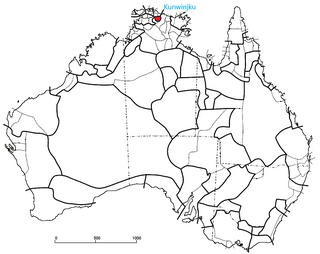
The Kunwinjku people are an Australian Aboriginal people, one of several groups within the Bininj people, who live around West Arnhem Land to the east of Darwin, Northern Territory. Kunwinjku people generally refer to themselves as "Bininj" in much the same way that Yolŋu people refer to themselves as "Yolŋu".
The Nyangumarta people, also written Njaŋumada, Njangamada, Njanjamarta and other variations, are a nation of Aboriginal Australians from the northwestern coast of Western Australia. According to Norman Tindale, they are divided into two distinct branches, the Kundal and the Iparuka.
The Barungguan are an Aboriginal Australian people of the Cape York Peninsula of Northern Queensland. The name is associated with three languages: Ganganda, Umpithamu and Morrobolam.
Keiadjara, also rendered Kiyajarra, were an Aboriginal Australian people of the Pilbara region of Western Australia.
The Mbewum were an indigenous Australian people of the Cape York Peninsula of northern Queensland. They were dispossessed and became extinct soon after colonization.
The Miwa are an Aboriginal Australian people of the Kimberley region of Western Australia.
The Wirngir are an Aboriginal Australian people of the Kimberley region of Western Australia.
The Arnga are an Aboriginal Australian people of the northern Kimberley region of Western Australia.
The Yeidji, also spelt Yiiji and other variants, commonly known as Gwini/ Kwini, are an Aboriginal Australian people of the Kimberley area of Western Australia, who also self-identify as Balanggarra.
The Wilawila are an indigenous Australian tribe of the Kimberley region of Western Australia.
The Ngalia, or Ngalea, are an Aboriginal Australian people of the Western Desert cultural bloc resident in land extending from Western Australia to the west of South Australia. They are not to be confused with the Ngalia of the Northern Territory.
The Jabirr Jabirr are an Aboriginal Australian people of the Kimberley region of Western Australia.

The Nyulnyul, also spelt Nyul Nyul, Njolnjol, Nyolnyol and other variants, are an Aboriginal Australian people of the Kimberley region of Western Australia.
The Malngin are an Aboriginal Australian people of the Kimberley region of Western Australia. The Malngin language was a dialect of Gurindj.
The Yankunytjatjara people, also written Yankuntjatjarra, Jangkundjara, and other variants, are an Aboriginal Australian people of the state of South Australia.
The Antakirinja, otherwise spelt Antakarinya, and alternatively spoken of as the Ngonde, are an indigenous Australian people of South Australia.
Yadaneru, also written Jeteneru, refers to a tribe at one time thought to have existed in the Cape York Peninsula of northern Queensland.

The Wirangu are an Aboriginal Australian people of the Western coastal region of South Australia.
The Kunggara, also known as Kuritjara, are an indigenous Australian people of the southern Cape York Peninsula in Queensland.
The Gungorogone are an indigenous Australian people of the Northern Territory.